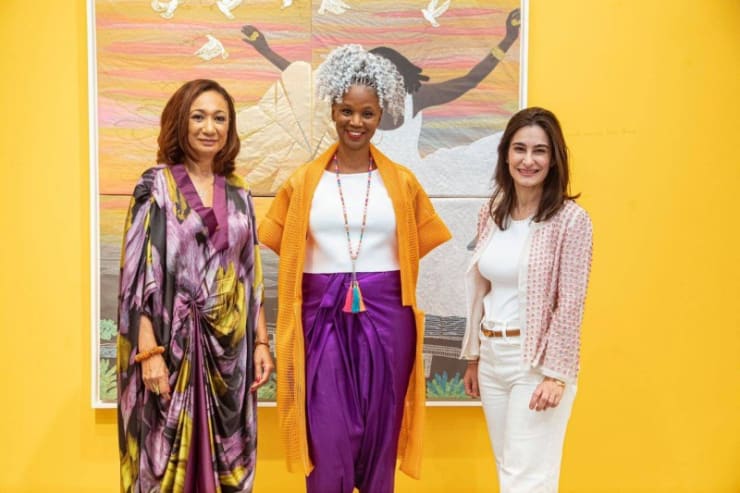JOANA CHOUMALI
Works
Biography
Joana Choumali is a visual artist and photographer based in Abidjan, Côte d’Ivoire.
She studied graphic arts in Casablanca, Morocco, and worked as an art director in an advertising agency before embarking on a career in photography.
Her practice spans conceptual portraiture, mixed media, and documentary photography. Much of her work responds to and reflects the diverse cultures surrounding her. In her recent works, Choumali embroiders directly onto her photographs, completing the creation of the photographic image with a slow and meditative gesture.
In 2014, she received the Cap Prize and the LensCulture Emerging Photographer Award. In 2016, she was awarded the Magnum Foundation Emergency Grant and the Fourthwall Books Award in South Africa. In 2017, she exhibited her series Translation and Adorn at the Côte d’Ivoire Pavilion during the 57th Venice Biennale. In November 2019, Choumali became the first African laureate of the Prix Pictet, awarded for her series Ça va aller, responding to the cycle’s theme of “Hope”.
Her work has been featured in international publications including CNN, The New York Times, The Washington Post, El País, Le Monde, The Guardian, HuffPost, Harper’s Bazaar Art, and The Financial Times, among others. Her book HAABRE was published in Johannesburg in 2016, followed by Ça va aller (Nazraeli Press, USA) in 2022. Her forthcoming book Alba’hian, published by GALERIE FARAH FAKHRI, will be launched at Abu Dhabi Art in November 2025.
In 2020, she was named the Robert Gardner Fellow in Photography by the Peabody Museum of Archaeology & Ethnology at Harvard University.
Choumali’s work is held in numerous public and private collections, including the Victoria and Albert Museum, London; the Metropolitan Museum of Art, New York; and the High Museum of Art, Atlanta. In 2017, she exhibited her series Translation and Adorn at the Pavilion of Côte d'Ivoire during the Venice Biennale.
Exhibitions
Art Fairs
Beyond our walls
Press
-

FT WEEKEND
Shifting SandsBaya Simons, FT Weekend, October 24, 2025 -

ArtReview
Joana Choumali La Terre n’a qu’un Soleil Galerie Farah Fakhri, Abidjan 16 May – 25 JulyChaze Matakala, ArtReview, September 1, 2025 -

ArtReview
Joana Choumali’s Abidjan DaydreamersChaze Matakala, ArtReview, July 22, 2025 -

BAAB Magazine
Autour de la GALERIE FARAH FAKHRI par Anne-Claire LecoulsAnne-Claire Lecouls, BAAB Magazine, June 21, 2025 -

Fraternité Matin
Brodeuse d'âme et tisseuse de lumièreSerges N'Guessant, Fraternité Matin, June 14, 2025 -

Afrique Magazine
Joana Choumali « Comme à la première lueur du jour »Astrid Krivian, Afrique Magazine, June 3, 2025 -

Fraternité Matin
Portrait/Joanna Choumali (Artiste photographe) : Brodeuse d’âme et tisseuse de lumièreSerge N'Guessant, Fraternité Matin, May 30, 2025 -

BBC NEWS AFRIQUE
Magazine de la culture : "J'ai décidé que mon travail serait imbibé de l'énergie du lieu que j'ai photographié et de mes pensées" - Joana ChoumaliValérie Bony, BBC NEWS AFRIQUE, May 23, 2025 -

Fraternité Matin
Exposition Photos "La Terre n’a qu’un soleil" : Joana Choumali montre les merveilles du lever du jourSerges N'Guessant, Fraternité Matin, May 14, 2025 -

the arts fuse
Visual Arts Review: Joana Choumali — No End of StuffLauren Kaufmann, the arts fuse, January 30, 2025
Publications















